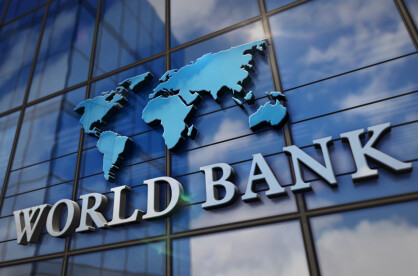A spectre looms over Ukraine
The situation unfolding in Europe might very well lead to far reaching global consequences.

Source - Getty Images
The situation unfolding in Europe might very well lead to far reaching global consequences.

Source - Getty Images
The latest update on the Ukraine-Russia crisis that is holding the world in a vice is the discussion between French President Emmanuel Macron and Ukrainian President Volodmyr Zelensky — a day after the French leader met with Russian President Vladimir Putin. This was the latest in a slew of high-level diplomatic interventions with the sole purpose of preventing the European continent plunging into a third world war.
Following the meeting, Macron stated to reporters that the next few days will be decisive and will require intensive discussions which we will pursue together." The five-hour discussion is the highest-profile intervention by a Western Leader in the current standoff.
In November 2013, the Ukranian administration of Viktor Yanukovych suspended signing the European Union Association Agreement (EUAA), after hyping it up since the majority of the Ukranian public wanted Ukraine to sign the agreement. This led to protests and riots in Ukraine, which were met with violent crackdowns by state security forces. This in turn drew even more protestors to the streets, which saw the government enacting anti-protest laws. The situation escalated until February 2014, when President Yanukovych fled the country and the parliament removed him from office.
During this time, protests were staged in Crimea and the eastern regions of Ukraine, near Russia. Taking advantage of this Russia invaded and annexed Crimea, under the guise of protecting the rights of Russian citizens and Russian speakers in Crimea and southeast Ukraine. The region was then formally annexed into Russian jurisdiction after a much-disputed local referendum through which the citizens voted to join the Federation, and this further heightened the conflict. The exchange of violence between separatists in Donetsk and the Ukrainian military has tallied up over 10,000 fatalities and more than double the number in injuries since April 2014, with sporadic shelling and gunfights along the Russian border.
The entire matter was further exacerbated with the downing of a Malaysian Airlines flight over Ukrainian airspace in the Donbas region (Donestsk and Luhansk) in July of the same year. Forensic findings indicate Russian weaponry was used, with further investigation by 2016 confirming that such a surface-to-air missile platform was moved in and out of eastern Ukraine, coinciding with the fatal attack.
The Minsk Accords between France, Germany, Russia and Ukraine, which sought to seek a solution to the Ukraine/Donbas conflict, failed to bring about a ceasefire in the region. Russia wanted autonomy for the Donbas region, since the region was prosperous and majority Russian-speaking, which was rejected by Ukraine. In 2016, NATO deployed four battalions of soldiers into Eastern Europe, rotating between Estonia, Latvia, Lithuania, and Poland, to bolster the deterrence presence, alongside a US Army tank brigade brought into Poland in 2017. Throughout this affair, cyberattacks have continuously hamstrung Ukrainian infrastructure, leading to loss of power for over 225,000 people across Ukraine. In June 2017 the NotPetya cyberattack, which went worldwide, caused billions of dollars in damages.
The United States has responded with continued threats of new sanctions on Russian individuals and companies related to the conflict, as well as the sale of anti-tank weaponry to Ukraine in 2018. They joined NATO alongside Ukraine — which is still not a member of NATO — to conduct large-scale air exercises in Western Ukraine, in response to the Russian military exercises a month earlier in September 2018, which, by far, has been the largest such exercise since the fall of the Soviet Union.
Currently, 100,000 fully-armed Russian soldiers, allegedly backed by field hospitals, blood transfusion supplies and other medical equipment, sit alongside immense contingents of artillery and air forces, throughout Belarus and the Ukrainian border that meets Russia. Their presence has been built up since September of 2021.
In December 2021, Russian President Vladimir Putin articulated his demands to the world, which include a demand that NATO remove any troops and weapons deployed to countries that entered the alliance after 1997. This would include much of Eastern Europe, including Poland, and the former Soviet Union countries of Estonia, Lithuania, Latvia and the Balkan countries. Putin also demanded that NATO rule out any further expansion in its membership, including the accession of Ukraine to the alliance. It also demanded that no further drills be carried out by NATO in Ukraine, eastern Europe, and Caucasus countries such as Georgia, or in Central Asia, without previous agreement with Russia.
The essence of the draft document brings to mind a spectre that once held the eastern European region behind an Iron Curtain. Described as the “greatest geopolitical catastrophe of the 20th century” by none other than Vladimir Putin himself in an essay he had once penned, the fall of the USSR may well have been what has paved the path for the region's recent history to date. Ukraine, as well as several other Eastern European countries, were once within the influence of the Soviet Union, and Ukraine takes special precedence for more reasons than that. The people of Russia are believed to have originated in the area that is now known as Kiev, and as such, shares a multitude of similarities in both culture and language with the Russian motherland.
Nations that could stop Putin with force include Germany, but even they are holding to a more pacified stance in the conflict. Urging diplomacy with the rest of the world, the German Chancellor Olaf Scholz had succeeded the popular Angela Merkel, yet his hold on the situation has been accused of being unrealistic. With memories of global conflict still held at the forefront of all diplomatic relations Germany holds with the rest of the world since World War II, their reluctance to show force in holding back Russia has been criticised from within and without.
However, questions also have to be raised as to why Ukraine has not been granted both EU and NATO membership till date. One possible explanation is that if Ukraine is granted NATO membership, then NATO countries will have to move troops into Ukraine in order to stave off a possible invasion from Russia. However, NATO countries, especially the United States, may not want to do so, right after its massive failure in Afghanistan.
Then there is also the question of Europe's energy dependency on Russia. Russia supplies gas and oil to Europe, and NATO and European countries will have to find alternative energy sources prior to declaring war against Russia. That Russia has managed to build up its foreign currency reserves from an increase in global oil prices is an advantage that it can use against possible sanctions.



